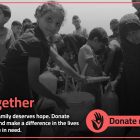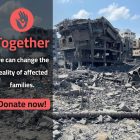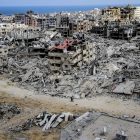With the ongoing conflict and no ceasefire in sight, it’s challenging to know exactly how or when we will be able to make a meaningful difference.
I have left Gaza, and I am now in Cairo. Leaving behind family and friends – including people who had been displaced and who we were sharing our home with – feels like a betrayal. But it was necessary.
My younger brother, Yazeed, who is 16, has epilepsy. When Israel began bombarding and laying siege to Gaza after 7 October, it became increasingly difficult to manage. We were breaking his remaining medication into tiny pieces to try to ration it. But we knew it was only a matter of time before the pieces would be too small to help and that we would eventually run out altogether.
I previously wrote about the crippling feeling of being a humanitarian aid worker living in the midst of one of the worst crises of our time and not being able to help. My own family and I faced daily struggles to get enough food. Thoughts of death and terror crept in when I closed my eyes at night. Conditions in Rafah, the southernmost city in Gaza, where we lived, were deteriorating by the day as hundreds of thousands of displaced people were pushed into the city. I witnessed the horrific aftermath of bombings, and I constantly asked myself: When will we be next?
Still, making the decision to leave wasn’t easy – and actually managing to get out was even harder. Now, the longing to go back to Gaza and play a part in its rebuilding is a relentless drive in me. I cling onto a fragile glimmer of hope that, one day, we will return to our beloved home.
Leaving Gaza
When we decided to leave, our mission was clear: to save Yazeed. We witnessed his health deteriorate with each passing day; his body convulsing with seizures due to the scarcity of medication and the intensity of the explosions around us. Our desperation knew no bounds.
The first time we went to the Rafah border crossing between Gaza and Egypt to try to leave, it was early November. At the time, it was impossible to get out unless you were an expat, a dual citizen, or you had a medical exemption. Still, so many people were trying to get out, and the approval process for medical exemptions was chaos.
Over the months, we went to the border three times to try to cross only to run into obstacles that forced us to turn around. Each time, the journey became more difficult and expensive. Because of the fuel scarcity in Gaza, the cost of taking a taxi was exorbitant, and the streets were crowded with displaced people living in tents. A car ride that should have taken us 20 minutes instead took an hour. In the absence of a ceasefire, every time we got in the car we prayed we wouldn’t become a target or collateral damage in a nearby bombing. Each trip was a relentless cycle of hope, fear, and despair.
Finally, at the end of January we were notified that our request had been approved, but not for my full family. Mohammad, my 20-year-old brother, would have to stay behind, while Yazeed, my mother, my seven-year-old sister, and I could leave.
After months of trying and failing, we were not expecting the news to arrive when it did. I remember that night was filled with the haunting symphony of explosions. The military invasion of Khan Younis, the city directly north of Rafah, was at its height. Rafah was the next target. We could feel the danger pressing closer, casting a shadow of uncertainty over our every thought. How could we possibly ensure Yazeed’s safety amidst such chaos?
Until then, the prospect of leaving Gaza had been theoretical. Now, we were afraid to be separated. We did not know how long it would be before Mohammad would be able to join us – or if it would even be possible. But my mother finally made the difficult decision for those of us who had been granted permission to leave.
I scrambled to pack, desperately attempting to cram everything I held dear into a single bag. Could I truly capture the essence of our lives in Gaza in such limited space? I gathered mementos I had from my father, who passed away two years ago, clinging to anything that bound me to the memory of Gaza.
Even with the danger and deprivation we had been living in, the idea of abandoning Gaza, with all its complexities and struggles, tore at my heart. I also knew that, once we crossed the border, our journey would be far from over – our heartache wouldn’t end. Everything we had experienced, and the weight of the ongoing war, would follow as we embarked on our uncertain path.
Life in Egypt
Since crossing the border, we have been trying to recover and sort out our lives. Departing felt like abandoning a part of ourselves – a separation from a land that shaped us through conflict and sorrow.
In Cairo, Yazeed has access to the medication he needs, and his condition has improved. We were also able to arrange for my brother, Mohammad, to join us. Still, our hearts remain heavy and we are burdened with an overwhelming sense of guilt.
Every day feels like an uphill battle against our own conscience. The simple act of eating makes us feel guilty, knowing that in Gaza, people are suffering from famine and deprivation. The sound of an aeroplane overhead sends shivers down our spines as we instinctively brace ourselves for an explosion, only to remember that we’re no longer in Gaza.
This isn’t the first time I’ve been to Cairo. In the past, when I visited, it was exciting and fun, with its vibrant culture and historic charm. Returning to Cairo under the current circumstances, however, is a reminder of the trauma and displacement we are facing.
Despite being physically removed from immediate danger, we find it difficult to feel safe or move on. We are glued to the television, hungry for any glimpse of news about the conflict, updates on the provision of humanitarian aid, information on the looming invasion of Rafah, or – hopefully – the announcement of a ceasefire.
Passing time is a struggle as we confront our inner traumas and attempt to support each other. My younger siblings, especially, do not understand all that is going on around them. They should be in school and university. We sometimes meet family members and friends who have also sought refuge in Cairo, but we do not meet frequently. It seems we are all navigating similar internal battles, questioning whether we can truly move forward while carrying the weight of our losses and uncertainties.
It is also Ramadan now, and it is so different than it was in Gaza, where we would gather with family, friends, and international colleagues to break our fast together by the beach. That festive atmosphere has been replaced by despair, overshadowed by war, starvation, and trauma. I never imagined that Ramadan would ever feel lonely.
An uncertain future
I hope that time heals, and that we will overcome all of these traumas someday. For now, we are just learning to be patient with ourselves.
But the situation in Gaza gets worse with each passing day. I barely get to talk to my friends and family because of the frequent cuts to the cellular network. When we do talk, they tell me that the suffering has only intensified. Many are now facing starvation and dehydration due to limited access to food and water. Many have been displaced multiple times since my departure almost two months ago. The situation in the north is even worse. People have nowhere to turn.
It’s heartbreaking to hear this from my loved ones, and it underscores the urgent need for international intervention to alleviate the suffering and the need to demand an immediate ceasefire.
My family is unsure how long we will remain in Egypt. When we left Gaza, our main concern was staying alive. Our future plans remain unclear. We haven’t had the opportunity to think ahead because our immediate focus has been on finding safety and stability. We’re taking each day as it comes.
I cannot shake the persistent feeling that I – along with many other aid workers – fell short in providing the support and assistance that was desperately needed during this time in Gaza.
We saw the suffering of people first hand. They were our neighbours and even our own families and ourselves. I also recognise the immense challenges we faced as aid workers. Despite our tireless efforts, there were limitations beyond our control that prevented us from fully meeting the needs of those affected. There’s definitely a feeling of guilt and self-doubt, but it’s also tempered by the knowledge that we did everything within our power to make a difference.
At the same time, my desire to continue my work as an aid worker is stronger than ever. I want to help rebuild Gaza and support its people in healing from all the traumas and losses we have been through. I want to help prevent such suffering from recurring, not just in my home but anywhere in the world where innocent lives are at stake. My commitment is fuelled by a profound belief in the inherent dignity of every human being.
With the ongoing conflict and no ceasefire in sight, however, it’s challenging to know exactly how or when we will be able to make a meaningful difference. Until there’s an end to the hostilities, neither I nor any other aid worker can fully unleash our potential to help.
Meanwhile, people in Gaza continue to suffer deep wounds and losses they may never recover from. For some, it’s the unbearable loss of loved ones. For others, it’s the devastation of homes built with love and dedication over years, now reduced to rubble and memories.
Loss took so many shapes: in the form of best friends and confidants who shared dreams and aspirations, suddenly torn away by the cruelty of conflict. It’s the heartache of lovers separated by forces beyond their control, longing for a future that may never come to pass. There is also the loss of spaces that were more than just brick. Places like Mercy Corps’ co-working spaces and offices – dedicated to fostering community and collaboration – have been silenced by the echoes of destruction.
These losses, in their many shapes and forms, cut deep into the fabric of Gaza’s collective soul, and so many of them will never be replaced. But, through the pain and grief, these losses are also a reminder of the resilience of people in Gaza and the desire to rebuild once again.





